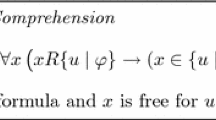Abstract
The notion of a "class as many" was central to Bertrand Russell's early form of logicism in his 1903 Principles of Mathematics. There is no empty class in this sense, and the singleton of an urelement (or atom in our reconstruction) is identical with that urelement. Also, classes with more than one member are merely pluralities — or what are sometimes called "plural objects" — and cannot as such be themselves members of classes. Russell did not formally develop this notion of a class but used it only informally. In what follows, we give a formal, logical reconstruction of the logic of classes as many as pluralities (or plural objects) within a fragment of the framework of conceptual realism. We also take groups to be classes as many with two or more members and show how groups provide a semantics for plural quantifier phrases.
Similar content being viewed by others
References
Aczel, Peter, 1988, Non-Well-Founded Sets, CSLI, Stanford.
Bell, John L., 2000, “Sets and Classes as Many,” Journal of Philosophical Logic, vol. 29,no. 6: 585-601.
Boolos, 1984, “To Be Is To Be a Value of a Variable (or to Be Some Values of Some Variables),” The Journal of Philosophy, vol. LXXXI,no. 8: 430-449.
Cocchiarella, Nino B., 1977, “Sortals, Natural Kinds and Re-identification,” Logique et Analyse, vol. 80: 439-474.
Cocchiarella, Nino B., 1987, Logical Studies in Early Analytic Philosophy, Ohio State University Press, Columbus.
Cocchiarella, Nino B., 1989, “Conceptualism, Realism, and Intensional Logic,” Topoi, vol. 7,no. 1 (1989): 15-34.
Cocchiarella, Nino B., 1996, “Conceptual Realism as a Formal Ontology,” in Formal Ontology, R. Poli and P. M. Simons, eds., Kluwer Academic Press, Dordrecht: pp. 27-60.
Cocchiarella, Nino B., 1998, “Reference in Conceptual Realism,” Synthese, vol. 114,no. 2: 169-202.
Cocchiarella, Nino B., 2001, “A conceptualist Interpretation of Leśniewski's Ontology,” History and Philosophy of Logic, vol. 22.
Freund, Max, 2001, “A Temporal Logic for Sortals,” Studia Logicavol. 69,no. 3, 351-380.
Geach, Peter T., 1980, Reference and Generality, third edition, Cornell University Press, Ithaca and London.
Goodman, Nelson, 1956, “A World of Individuals,” in The Problem of Universals, University of Notre Dame Press, Notre Dame.
Holmes, M. Randall, 1998, Elementary Set Theory with a Universal Set, Cahiers Du Centre De Logique, Bruylant-Academia, Louvain-la-Neuve, Belgium.
Quine, Willard V. O., 1974, The Roots of Reference, Open Court, La Salle, Ill.
Russell, Bertrand, 1903, The Principles of Mathematics, second edition, Norton & Co., N. Y., 1938.
Russell, Bertrand, 1919, Introduction to Mathematical Philosophy, George Allen & Unwin, LTD., London.
Schein, Barry, 1993, Plurals and Events, MIT Press, Cambridge.
Sellars, Wilfrid F., 1963, “Grammar and Existence: A Preface to Ontology,” reprinted in Science, Perception and Reality, Routledge & Kegan Paul, London.
Simons, Peter M., 1982, “Plural Reference and Set Theory,” in Parts and Moments, Studies in Logic and Formal Ontology, Barry Smith, ed., Philosophia Verlag, Munich and Vienna: pp. 199-260.
Author information
Authors and Affiliations
Rights and permissions
About this article
Cite this article
Cocchiarella, N.B. On the Logic of Classes as Many. Studia Logica 70, 303–338 (2002). https://doi.org/10.1023/A:1015190829525
Issue Date:
DOI: https://doi.org/10.1023/A:1015190829525




